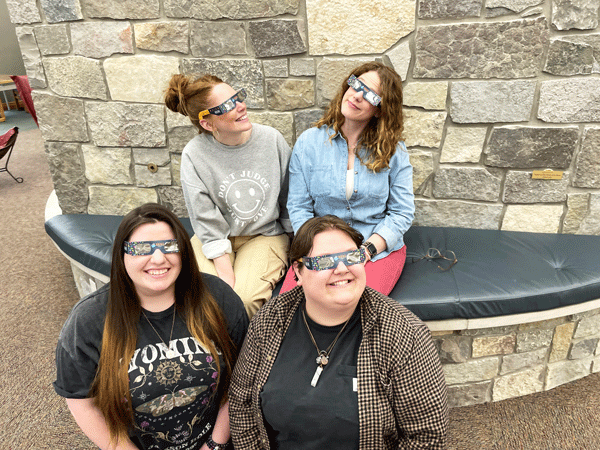By William Meiners
Herald Staff Writer
Mid-Michiganders need not go far to observe a near total eclipse of the sun on Monday afternoon. As many make travel plans for Ohio and Indiana to see a complete totality, the Alma Public Library and Alma College are making it easy for those to simply step outside and observe a scientific phenomenon that could amount to a once-in-a-lifetime opportunity for some.
The Alma Library is giving away eclipse glasses — up to two pairs per household — that will enable wearers a safe observation of the sun. Marla Drury, juvenile and young adult librarian, reported that the eclipse will begin at approximately 1:57 p.m. on Monday, April 8, and end around 4:25 p.m. The expected 93.8 percent coverage of the sun in Alma, she said, will occur around 3:12 p.m.
“This is a really exciting opportunity for our patrons because the next total solar eclipse in 2044 will only be visible to a small portion of the United States,” Drury said. “Another one in 2045 will cross most of the country, but much farther south, so Michigan will be far out of the path of totality. One isn’t expected to be as close to Michigan as this year’s until 2099.”
For Steuard Jensen, a professor of physics at Alma College, a solar eclipse is right in his wheelhouse. It’s been on his radar since the last eclipse in 2017. “There was a lot of excitement about the fact that within a decade there was going to be two total solar eclipses passing across North America,” he told The Herald on Good Friday.
As good fortune would have it, the eclipse in 2017 passed over his mother’s house in Lincoln, Nebraska. So Jensen traveled with his family from Alma, met up with his sister and her family from California, and saw the eclipse near the place that may have helped put him on the path to earning his PhD in physics from the University of Chicago.
A childhood camping trip to rural western Nebraska, far from the city lights in Lincoln, revealed the endless skies to Jensen. “It was the first time I had ever seen so many stars and the Milky Way splashed across the heavens,” he said. “That and other science experiences inspired me to want to understand the universe.”
Physics, in particular, Jensen noted, is about understanding the deep workings of everything. “I am absolutely thrilled to discover new things that make the universe tick,” he said. “I also really love sharing those things with other people, which is why being a professor is fun for me.”
The fun behind the science and the solar eclipse on Monday has everything to do with timing and alignment. Like two ships passing in the night (or mid-afternoon). “The moon orbits the earth, and the earth orbits the sun,” Jensen said. “Every now and then the moon’s plane of orbit overlaps with the angle that we are orbiting the sun in just the right way so that the moon is between the earth and the sun.”
When that happens, the moon casts a shadow on the earth. “In the path of a total eclipse, passing through Ohio relatively close to here and other places, the moon is perfectly lined up to completely cover the sun for a few minutes,” Jensen said.
Jensen likened the forthcoming eclipse in mid-Michigan to a “near miss,” with the moon crossing the sun almost completely. At plus 90 percent, the edge of the sun will be visible the whole time, but the day will certainly darken from what it will normally be at that hour.
Though there will be essentially “watch parties” in the middle of the Alma College campus, Jensen and some of his crew will travel to Toledo, Ohio, to catch the total eclipse. Traveling in the night before, he suspects to be heading back to Michigan in heavy traffic.
Even as they travel, Jensen said he will be keeping a sharp eye on the weather and weather reports. If they need to outrun some clouds, he said they may head farther east or south in Ohio to get a better view of the eclipse. Though he said the 2017 eclipse in his mother’s backyard happened to be an overcast day. However, the clouds were relatively light, and they saw the show just fine.
Safety is key in viewing an eclipse — whether you’re hitting the road or looking up from your own backyard. Jensen, and everyone else, will tell you not to look directly at the sun. You can pick up the glasses or use solar filters and viewers.
Although not everyone can afford to skip out of school or work on a Monday afternoon, it might be a good idea to take a mental health day. In the name of science, of course. The Alma Library will offer activities from 2 to 4:30 p.m., and there will be something of a crowd on Alma College’s campus. Should the stars align, there would be nothing but blue skies for the local viewing.

